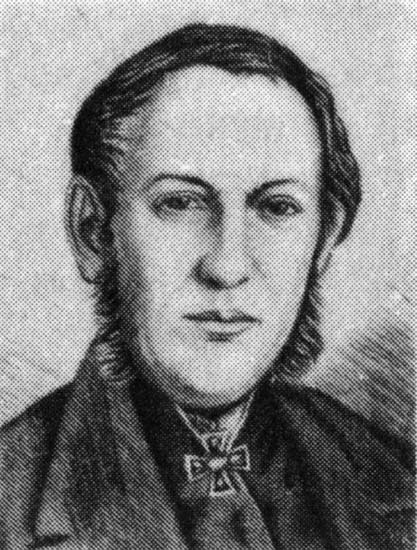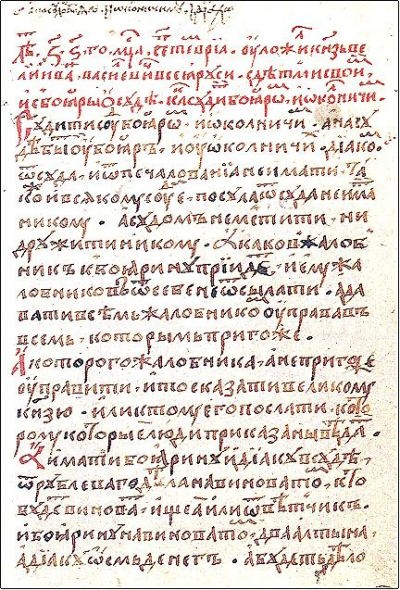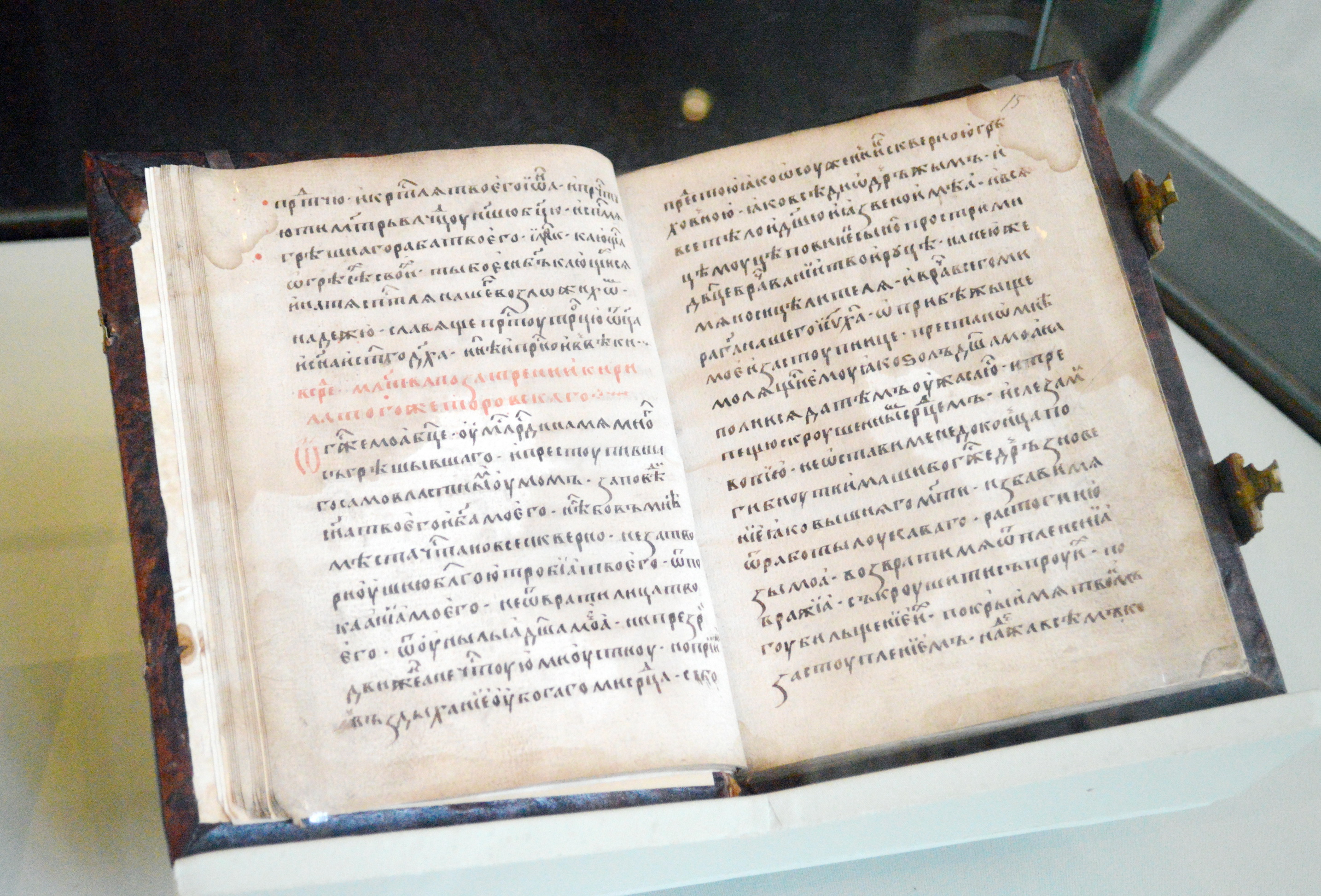|
Archaeographical Expedition
Pavel Mikhailovich Stroyev (Павел Михайлович Строев; 1796–1876) was a Russian paleographer who brought to light some of the most important sources of Russian history, including the Sudebnik of 1497, the homilies of St. Cyril of Turov, the Slavic text of George Hamartolus, and of 1073.''The Peasant in 19th-century Russia'' (ed. by W. S. Vucinich). Stanford University Press, 1968. Pages 220-221. He worked under the auspices of Count Nikolai Rumyantsev hand in hand with until the latter went insane in 1825. In 1817 and 1818 Stroev and Kalaidovich wandered from monastery to monastery around Moscow in search of ancient manuscripts. They published several texts of international treaties and other historical documents from the Moscow archive in 1819–21. Seven years later Stroyev launched the first of his " archaeographic expeditions" that led him through no less than 14 provinces in 1829-34 and resulted in the publication of more than 3000 historical documen ... [...More Info...] [...Related Items...] OR: [Wikipedia] [Google] [Baidu] |
Paleographer
Palaeography ( UK) or paleography ( US; ultimately from grc-gre, , ''palaiós'', "old", and , ''gráphein'', "to write") is the study of historic writing systems and the deciphering and dating of historical manuscripts, including the analysis of historic handwriting. It is concerned with the forms and processes of writing; not the textual content of documents. Included in the discipline is the practice of deciphering, reading, and dating manuscripts, and the cultural context of writing, including the methods with which writing and books were produced, and the history of scriptoria. The discipline is one of the auxiliary sciences of history. It is important for understanding, authenticating, and dating historic texts. However, it generally cannot be used to pinpoint dates with high precision. Application Palaeography can be an essential skill for historians and philologists, as it tackles two main difficulties. First, since the style of a single alphabet in each given langu ... [...More Info...] [...Related Items...] OR: [Wikipedia] [Google] [Baidu] |
Sudebnik Of 1497
The Sudebnik of 1497 (''Судебник 1497 года'' in Russian, or Code of Law) was a collection of laws introduced by Ivan III in 1497. It played a big part in the centralisation of the Russian state, creation of the nationwide Russian Law and elimination of feudal fragmentation.Monuments of Russian Law. Vol. 3: Monuments of Law in the Period of Formation of Russian Centralized State in 14—15 centuries / ed. by Lev Cherepnin. Moscow, 1955. P. 419—420, 426—432, 438—457. (russianПамятники русского права. М.: Госюриздат, 1955. Вып. 3: Памятники права периода образования Русского централизованного государства XIV—XV вв./ под ред. Л.В. Черепнина. С. 341—416. Also full Old Russian text and translation into modern Russian). It took its roots from Old Russian Law, including Russkaya Pravda, Legal Code of Pskov, princely decrees, and common law, the ... [...More Info...] [...Related Items...] OR: [Wikipedia] [Google] [Baidu] |
Cyril Of Turov
Cyril of Turov, alternately Kirill of Turov (Church Slavonic Кѷриллъ Туровськiй, be, Кірыла Тураўскі, russian: Кирилл Туровский; 1130–1182) was a bishop and saint of the Russian Orthodox Church. He was one of the first and finest theologians of Kievan Rus'; he lived in Principality of Turov, now southern Belarus. His feast day in the Eastern Orthodox Church is on 28 April. He was added to the Roman Catholic Church calendar by Pope Paul VI in 1969. Cyril of Turov For centuries Cyril of Turov enjoyed considerable prestige as a writer; his works were continuously copied and imitated. According to Zenkovsky's assessment of Cyril's heritage: "Cyril, Bishop of Turov, was probably the most accomplished master of Orthodox theology and the Byzantine style of writing. He had an excellent command of Greek and his literary achievements surpass those of any other Russian man of letters of that era ... Of all his works, Cyril's sermon with the ... [...More Info...] [...Related Items...] OR: [Wikipedia] [Google] [Baidu] |
George Hamartolus
George Hamartolos or Hamartolus ( el, ) was a monk at Constantinople under Michael III (842–867) and the author of a chronicle of some importance. Hamartolus is not his name but the epithet he gives to himself in the title of his work: "A compendious chronicle from various chroniclers and interpreters, gathered together and arranged by George, a sinner ()". It is a common form among Byzantine monks. German 19th century scholar Karl Krumbacher (''Byz. Litt.'', 358) protested against the use of this epithet as a name and proposed (and used) the form Georgios Monachos (Γεώργιος Μοναχός "George the Monk"). Nothing is known about him except from the internal evidence of his work, which establishes his period (in the preface he speaks of Michael III as the reigning emperor) and his calling (he refers to himself several times as a monk). Chronicle The chronicle consists of four books. The first treats of profane history from Adam to Alexander the Great; the second, of ... [...More Info...] [...Related Items...] OR: [Wikipedia] [Google] [Baidu] |
Nikolai Rumyantsev
Count Nikolai Petrovich Rumyantsev (; 3 April 1754 – 3 January 1826), born in Saint Petersburg, was Russia's Foreign Minister and Chancellor of the Russian Empire in the run-up to Napoleon's invasion of Russia (1808–12). He was the son of Field Marshal Pyotr Rumyantsev-Zadunaisky from the Rumyantsev comital family. Background Rumyantsev and his brother were provided with basic education at home. Their mentor was Friedrich Melchior, Baron von Grimm. In 1774 they went to Leiden University where they studied history, law and language. Official career Rumyantsev was the first envoy of Russia to the Holy Roman Empire after Russia became a guarantor of the imperial constitution through the Treaty of Teschen (1779). He arrived in 1782 accredited as ambassador to the Electoral Rhenish Circle, Upper Rhenish Circle, Swabian Circle, Franconian Circle, Electorate of Mainz, Electorate of Cologne, Palatine Zweibrücken, Duchy of Württemberg, Margraviate of Baden and Landgravia ... [...More Info...] [...Related Items...] OR: [Wikipedia] [Google] [Baidu] |
Moscow
Moscow ( , US chiefly ; rus, links=no, Москва, r=Moskva, p=mɐskˈva, a=Москва.ogg) is the capital and largest city of Russia. The city stands on the Moskva River in Central Russia, with a population estimated at 13.0 million residents within the city limits, over 17 million residents in the urban area, and over 21.5 million residents in the metropolitan area. The city covers an area of , while the urban area covers , and the metropolitan area covers over . Moscow is among the world's largest cities; being the most populous city entirely in Europe, the largest urban and metropolitan area in Europe, and the largest city by land area on the European continent. First documented in 1147, Moscow grew to become a prosperous and powerful city that served as the capital of the Grand Duchy that bears its name. When the Grand Duchy of Moscow evolved into the Tsardom of Russia, Moscow remained the political and economic center for most of the Tsardom's history. When th ... [...More Info...] [...Related Items...] OR: [Wikipedia] [Google] [Baidu] |
Archaeographic Expeditions
The Archaeographic Commission (Археографическая комиссия) was set up in St. Petersburg in 1834 by Platon Shirinsky-Shikhmatov, Nikolay Ustryalov, and Pavel Stroyev with the aim of publishing historical and ethnographic materials assembled by Stroyev and others in the provinces of Imperial Russia. The commission was affiliated with the imperial ministry of education and was modeled on an earlier commission based in Moscow. Its first major enterprise was the Complete Collection of Russian Chronicles, published from 1841 onward. Regional archaeographical commissions were established in Kiev, Vilna, and Tiflis. The commission spearheaded efforts to obtain foreign sources on Russian history and sent its emissaries in search of Russia-related documents to the major archives of Europe. After Shirinsky-Shikhmatov the commission's presidents included Avraam Norov (1850–69), Vladimir Titov (1871–91), Sergei Platonov (1918–29), Nikolay Likhachov (1929), a ... [...More Info...] [...Related Items...] OR: [Wikipedia] [Google] [Baidu] |
Petersburg Academy Of Sciences
The Russian Academy of Sciences (RAS; russian: Росси́йская акаде́мия нау́к (РАН) ''Rossíyskaya akadémiya naúk'') consists of the national academy of Russia; a network of scientific research institutes from across the Russian Federation; and additional scientific and social units such as libraries, publishing units, and hospitals. Peter the Great established the Academy (then the St. Petersburg Academy of Sciences) in 1724 with guidance from Gottfried Leibniz. From its establishment, the Academy benefitted from a slate of foreign scholars as professors; the Academy then gained its first clear set of goals from the 1747 Charter. The Academy functioned as a university and research center throughout the mid-18th century until the university was dissolved, leaving research as the main pillar of the institution. The rest of the 18th century continuing on through the 19th century consisted of many published academic works from Academy scholars and a few Ac ... [...More Info...] [...Related Items...] OR: [Wikipedia] [Google] [Baidu] |
Fyodor Andreyevich Tolstoy
Fyodor, Fedor (russian: Фёдор) or Feodor is the Russian form of the name "Theodore" meaning “God’s Gift”. Fedora () is the feminine form. Fyodor and Fedor are two English transliterations of the same Russian name. It may refer to: Given names ;Fedor *Fedor Andreev (born 1982), Russian / Canadian figure skater *Fedor von Bock (1880–1945), German field marshal of World War II *Fedor Bondarchuk (born 1967), Russian film director, actor, producer, clipmaker, TV host *Fedor Emelianenko (born 1976), Russian mixed martial arts fighter *Fedor Flinzer (1832–1911), German illustrator *Fedor den Hertog (1946–2011), Dutch cyclist *Fedor Klimov (born 1990), Russian skater *Fedor Tyutin, Russian ice hockey player ;Feodor *Feodor Chaliapin (1873–1938), Russian opera singer *Feodor Machnow (1878–1912), "The Russian Giant" *Feodor Vassilyev (1707–1782), whose first wife holds the record for most babies born to one woman ;Fjodor *Fjodor Xhafa (born 1977), Albanian football ... [...More Info...] [...Related Items...] OR: [Wikipedia] [Google] [Baidu] |
Russian Palaeographers
Russian(s) refers to anything related to Russia, including: *Russians (, ''russkiye''), an ethnic group of the East Slavic peoples, primarily living in Russia and neighboring countries *Rossiyane (), Russian language term for all citizens and people of Russia, regardless of ethnicity *Russophone, Russian-speaking person (, ''russkogovoryashchy'', ''russkoyazychny'') * Russian language, the most widely spoken of the Slavic languages * Russian alphabet * Russian cuisine *Russian culture *Russian studies Russian may also refer to: *Russian dressing *''The Russians'', a book by Hedrick Smith *Russian (comics), fictional Marvel Comics supervillain from ''The Punisher'' series * Russian (solitaire), a card game * "Russians" (song), from the album ''The Dream of the Blue Turtles'' by Sting *"Russian", from the album ''Tubular Bells 2003'' by Mike Oldfield *"Russian", from the album '' '' by Caravan Palace * Nik Russian, the perpetrator of a con committed in 2002 *The South African name ... [...More Info...] [...Related Items...] OR: [Wikipedia] [Google] [Baidu] |
Russian Philologists
This list of Russian linguists and philologists includes notable linguists from the Russian Federation, the Soviet Union, the Russian Empire and other predecessor states of Russia. Alphabetical list __NOTOC__ A *Vasily Abaev, prominent researcher of Iranian languages * Solomon Adlivankin, Soviet linguist, the founder of Perm derivatology school, took part in compiling Akchim dialect dictionary * Vladimir Admoni, linguist, literary critic, translator and poet, worked on the theory of grammar, historic and modern German syntax, defended Joseph Brodsky in court in 1964 *Alexander Afanasyev, leading Russian folklorist, recorded and published over 600 Russian fairy tales, by far the largest folktale collection by any one man in the world B *Ivan Baudouin de Courtenay, co-inventor of the concept of phoneme and the systematic treatment of alternations, pioneer of synchronic analysis and mathematical linguistics *Victor Bayda, linguist specializing in Celtic languages, Celtic and Ge ... [...More Info...] [...Related Items...] OR: [Wikipedia] [Google] [Baidu] |






